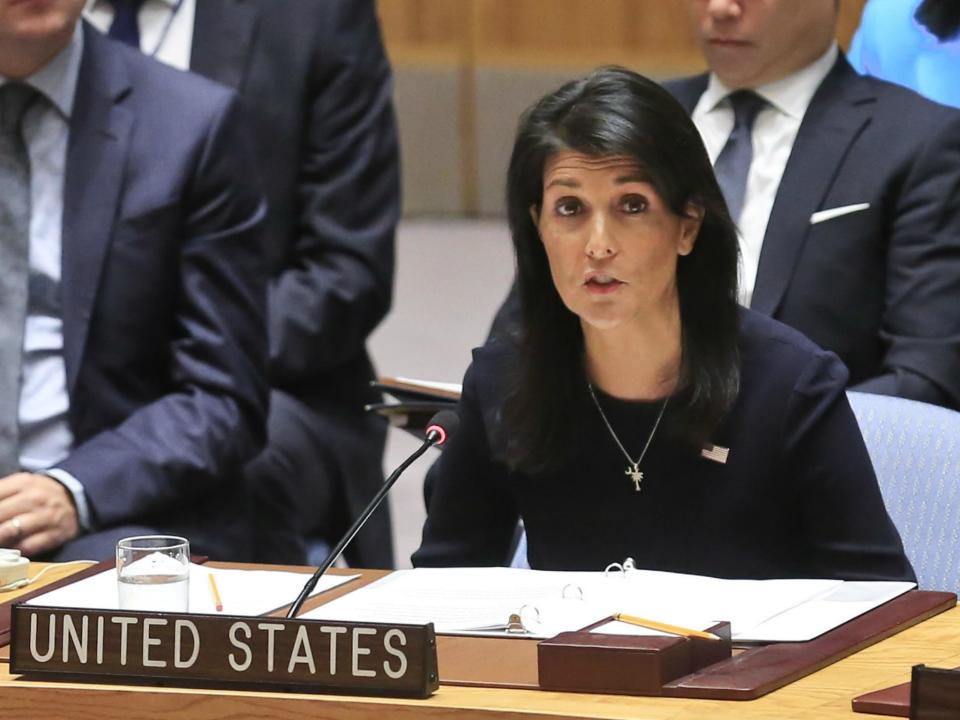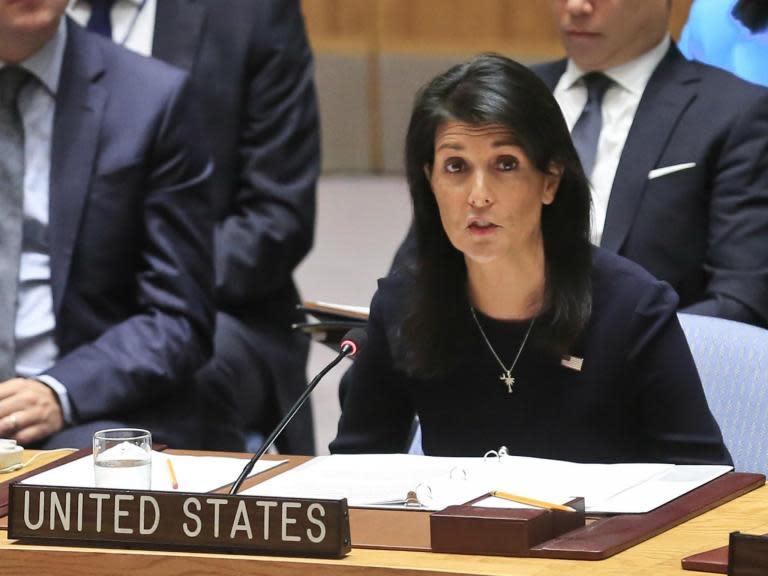Kim Jong-un is 'begging for war', says US ambassador to UN Nikki Haley
Tensions between the US and North Korea have risen sharply as US ambassador to the United Nations said Pyongyang was “begging for war” after its testing of a thermonuclear device more powerful than the bomb dropped on Hiroshima.
“The time has come to exhaust diplomatic means before it’s too late,” Nikki Haley said, during an emergency meeting of the UN Security Council.
As Switzerland said it was prepared to act as a mediator, Ms Haley began her remarks by going through a history of UN actions against North Korea and repeated her belief that “enough is enough”. She called for the UN to vote next week to impose the toughest sanctions possible.
“Twenty-four years of half measures and failed talks is enough,” Ms Haley said, in what has become her characteristically bold rhetoric in the Security Council.
She praised her colleagues in the room for showing “unusual unity” when they passed the strongest sanctions ever on North Korea last month, banning exports on seafood, coal, and iron in a blow to the isolated leader Kim Jong-un‘s economy.
However, Pyongyang has conducted its sixth nuclear test just a few days ago, according to US intelligence officials.
UN Secretary General Antonio Guterres has said the latest test was “profoundly destabilising for regional security”.
“We have nothing to cause us to doubt that this was a test of an advanced nuclear device,” a US official said, speaking to Reuters on condition of anonymity.
Over the weekend, North Korea claimed to have tested an advanced hydrogen bomb that was capable of being launched inside a long-range missile.
The US official said, however, it would take some time to complete a thorough analysis of the size of the blast and type of device detonated.
While the nature of the nuclear bomb is unclear, the US Geological Survey reported a seismic event of 6.3 on the Richter scale as a result of the test. Previous Pyongyang tests have resulted in events closer to five on the scale.
In July, US intelligence officials said they believed North Korea had been able to make a nuclear warhead capable of fitting on an intercontinental ballistic missile (ICBM) as well. Recently, Pyongyang also launched a missile over the Hokkaido island of Japan.
Donald Trump tweeted after the latest test of the alleged hydrogen bomb that the US is considering “stopping all trade” with any countries “doing business” with North Korea, which would include America’s largest trading partner, China.
Other large volume US trading partners like Mexico, India, Pakistan and the Philippines.
Ms Haley reiterated the President’s stance on trade during the emergency meeting as well, in what seemed to a be a thinly veiled warning to China.
“The US will look at every country that does business with North Korea as giving aid” to Mr Kim, who “wants to be acknowledged as a nuclear power” but does not understand the responsibility that comes with being one, Ms Haley said.
China‘s representative to the UN, Liu Jeiyi, said that Beijing recognised the situation on the Korean peninsula was “deteriorating constantly”.
However, he called for the crisis to be “peacefully” resolved and was clear: “China will never allow chaos and war on the peninsula.”
China and Russia have partnered once again to offer a “two-track” solution that involves Pyongyang suspending nuclear tests while the US and South Korea suspending their military exercises in the region, but it is unclear how the “dialogue” will actually start.
“A so-called freeze-for-freeze is insulting,” Ms Haley had said in her remarks.
Ms Haley also stressed that the US does not want war, but “our country’s patience is not unlimited”.
On 3 September, Mr Trump met with Defence Secretary James Mattis and a “small group” of military officials at the White House to discuss all available military solutions to the crisis.
Mr Mattis said the US is not looking for the “total annihilation” of North Korea, but stressed that there were “many options” in how to respond to Pyongyang’s latest nuclear bomb test.
“We made it clear we have the ability to defend ourselves and our allies,” Mr Mattis said, standing at a podium in front of the White House, flanked by chairman of the joint chiefs General Joseph Dunford.
Mr Mattis said Kim Jong-un should “take heed” of the United Nations Security Council’s “unified voice” on the issue, as shown by its decision to impose sanctions as well as its “commitment to denuclearise the Korean peninsula”.
The Defence Secretary also stressed the “iron-clad” commitments of the US to allies like South Korea and Japan.
“Any threat to the US”, its territories – such as the Pacific island of Guam – or its allies would be met with a “massive military response ... both effective and overwhelming,” Mr Mattis said.
Neutral Switzerland said it was ready to mediate with North Korea, by hosting ministerial talks. Swiss President Doris Leuthard, said her country’s troops were deployed on the demarcation zone between South Korea and North Korea and said that Switzerland – along with Sweden – had a long history of discreet diplomacy.
But she said China and the US had to take their share of responsibility, warning against “overreactions” after the North’s sixth and largest nuclear test, according to Reuters.
“I think it really is time for dialogue,” she said at a news conference in Bern. “We are ready to offer our role for good services as a mediator. I think in the upcoming weeks a lot will depend on how the US and China can have an influence in this crisis. That’s why I think Switzerland and Sweden can have a role behind the curtain.”


